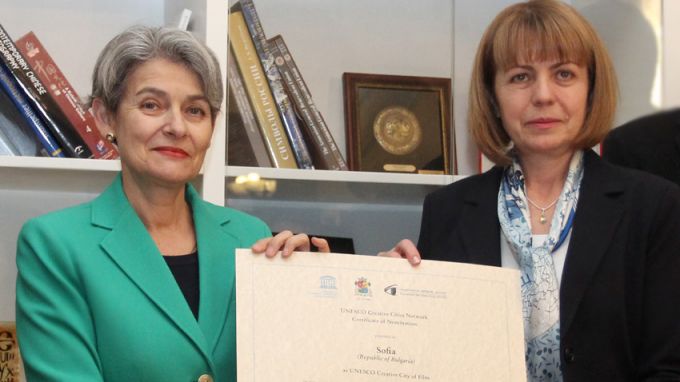
A meeting took place at the Ministry of Culture between Ms. Irina Bokova, UNESCO Director-General, and Bulgaria's Culture Minister Vezhdi Rashidov. Since 2009, for a second mandate, Bulgaria's Bokova is the highest-ranking official in this world organization. She is regarded as one of the possible future UN leaders. Minister Rashidov recalled that during her previous mandate a Regional Centre for the Intangible Cultural Heritage in Southeastern Europe was established in Bulgaria under the auspices of UNESCO. Most recently, the traditional Bulgarian carpets made for centuries in the town of Chiprovtsi via an ancient technology on a vertical loom, were included in UNESCO's intangible heritage. So far this country, a crossroads of civilizations over the centuries, has seven monuments of material culture on UNESCO's list, two natural and already three on the intangible heritage list. "Of course, as happy as we may be, we are also aware of our responsibilities and obligations to UNESCO," Rashidov said.
"The inclusion of the Chiprovtsi carpets in the intangible heritage list is a great success, a great joy for all of us. The most important thing is that we have plans for the future”, Irina Bokova noted. She came to Sofia to deliver to Sofia Mayor Yordanka Fandakova a certificate of the city's inclusion in another large network of UNESCO - the network of creative cities.
"Sofia is a city of cinema, it is a recognition of everything that has been done for the film industry and culture in a general plan in order to create a cozy urban environment. Also for stimulating the economic growth and of tourism, if you will", Irina Bokova added. "This is a large global network and Sofia became part of it. Not all cities that apply are included in it, we are talking about a very serious process of evaluation by experts. Sofia, however, went through this process and I am very happy that this thing is happening."
The meeting of the UNESCO Director General and Minister Rashidov was united around the theme "Culture as a vector of development - jobs, tourism, museums, and crafts". This is what Deyana Danailova in charge of international cooperation in the Ministry told Radio Bulgaria:
"It was concluded that we should reconsider existing policies in the field of culture and develop new strategies adequate to the present time. Also we must highlight the importance of culture in achieving the Millennium Development Goals. Repeatedly it was stressed that culture as an integrated sector, which covers the tangible and intangible heritage, cultural and creative industries, but also the entire cultural infrastructure, which supports the development and the presentation of the culture - all this leads to the achievement of sustainable development in terms of reducing poverty, gender inequality, promote social inclusion and last but not least – boost the creation of new jobs. Because statistics in recent years is a convincing evidence that perhaps in culture - one of the few areas in times of crisis that is generating jobs, demonstrates great growth at the expense of other industries."
English Rossitsa Petcova
"Tableware", "assembly line", "production process" - this is the terminology of the so-called applied artists of 20th century Bulgaria. But one artist, trapped within the confines of a socialist factory, broke free and gave wings to her talent...
A feature film is being made about the life of Lili Ivanova, the team of the biggest name in Bulgarian pop music announced. The film has the working title "Lili - Love is Life". Bulgarian pop legend Lili Ivanova awarded the President's Badge of..
The premiere of the Bulgarian-Ukrainian film "The End of the River" by Bessarabian-Bulgarian director Vasil Barkov will take place today at 6.30pm at the Cinema House (37, Exarch Joseph Street, Sofia). The film is "an emotional and visually striking..
This year, 2025, marks the 55th anniversary of the groundbreaking ceremony for the new Bulgarian National Radio building at 4 Dragan Tsankov Street...

+359 2 9336 661
